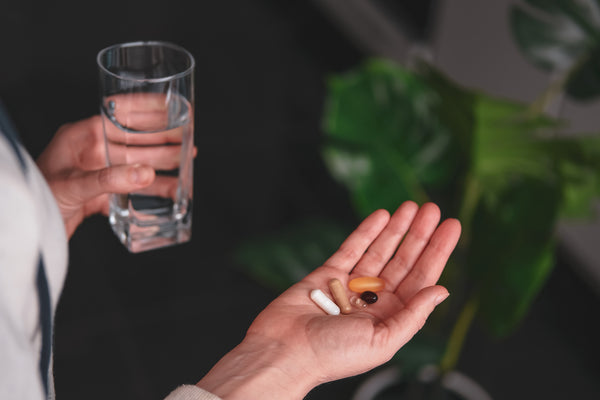How Much Zinc Per Day Is Healthy?

Read time: 2 minutes
Zinc is an essential mineral that you can find naturally present in certain foods and in dietary supplements. Every cell throughout your body uses zinc.
It’s involved in supporting several aspects of cellular health in the body. It’s also responsible for interacting with over 100 enzymes in your body.
We need zinc to stay healthy. It plays a tremendous role in:
- Immune health
- Skin health
- DNA production
- Cell health
- Healthy growth & development
Zinc is also incredibly popular during the fall and winter, which is typically cold and flu season.
Most importantly, a daily intake of zinc is needed because your body has no specialized way to store it.
How Much Zinc Do You Need? And Are You Getting Enough Zinc?
The NIH regularly updates and provides Recommended Dietary Allowances for zinc. Here you can find how much zinc per day for a man, how much zinc per day for a woman, and how much zinc per day based on age. This information should not take the place of medical advice. We encourage you to talk to your doctor about what zinc intake may be best for your overall health.
Your body obtains zinc either from foods that contain zinc or from a daily zinc supplement & it is not stored. For this reason, it’s not uncommon to be deficient in zinc. Especially those with digestive disorder, bowel disease, or with a previous gastrointestinal surgery.
Signs of Zinc Deficiency
It’s important to be aware of the possible signs and symptoms of zinc deficiency. People may experience:
- Loss of smell or taste (these losses from zinc are usually temporary)
- Poor appetite
- Feeling lethargic
- Decreased immunity - being more susceptible to the common cold, flu, and other bacteria or viruses
- Delayed wound healing - a cut, break in the skin, or other types of wounds
- Diarrhea
- Hair loss
- Unexplained weight loss
These signs are very general, and of course, can be signs of other things happening in your body. If you’re showing any of these signs, please consult your health professional for further information and help with any of these conditions.
Getting Zinc From Your Diet
Here is a list of the highest zinc foods that you can refer to that may help you increase your zinc intake so you can maintain a healthy daily level.
- Meat - Red meats are best, such as beef, pork, and lamb. Also, chicken.
- Eggs - Whole and large eggs are best, plus you will get some good protein, healthy fats, and B vitamins too!
- Whole Grains - The best grains are wheat, quinoa, brown rice, and oats. An added benefit is they will help with heart disease.
- Dairy - Milk and cheese are the best to consume in this category. A bonus is it will help with your calcium intake and bone health.
- Legumes - Chickpeas, lentils, and grains are best as they are all high in zinc. For more viability, soak the beans and grains before cooking.
- Some vegetables - Regular and sweet potatoes, green beans, and kale.
- Seeds – Hemp, squash, pumpkin, and sesame seeds.
- Shellfish - Oysters have the highest level of zinc in this category. Then Alaskan crab, shellfish, and mussels. If you’re pregnant, please talk to your healthcare professional before choosing this food group.
- Nuts - The nut highest in zinc is cashew. Then pine nuts, peanuts, and almonds are good as well.
- Dark Chocolate - Good news, chocolate lovers. You can find a good amount of zinc in dark chocolate. But you need to be aware that it can also be very high in calories. So, it’s not the highest on our list as the best source of zinc.
You can also refer to the NIH or trusted health sources for more information on the content of zinc in select foods.
The EZ Melts Difference
It’s important to have a daily routine of feeding your body the nutrients it needs. Supplements are the easiest and quickest way of ensuring you get the correct amount.
Many vitamin supplements are solid and have a ton of chemical additives, which can cause stomach upset, so quality matters.
Make sure you are choosing a brand that cares about what they put into their supplements as much as you care about what goes into your body. Check out our Zero-Sugar, Vegan, Gluten-Free, Non-GMO, melt-in-your-mouth Zinc tablets.
Share


















